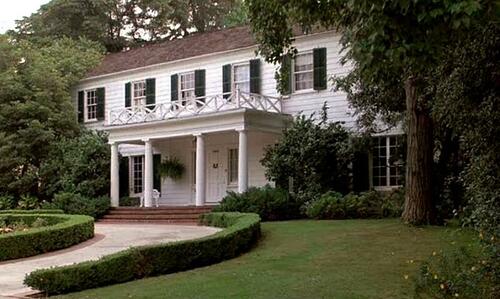
There's an old saying that you can never go home again, yet nearly half of all adults would do just that... if they could only afford it.
A survey from Zillow had found that 44% of Americans would buy their childhood home if cost were not an issue, yet only half of all adults say they could afford it at today's prices. An even larger share of millennials and Gen Z adults would buy their childhood home today. It suggests that the nostalgia craze that has swept pop culture, social media, fashion and marketing has reached housing.
"It appears younger generations aren't just nostalgic for low-rise jeans and Barbie, but for a simpler time in their lives when home was a place of comfort and safety," said Manny Garcia, a senior population scientist at Zillow who conducted this research. "They may associate positive memories with their childhood home, having lived there without the burdens of rent, mortgage payments, maintenance, insurance or other housing hurdles. Today, a comparable home can feel out of reach, especially for younger adults who aspire to buy, but face steep affordability challenges."
Children of the 1980s and 1990s are the most likely to say they would buy their childhood home today — 62% and 55% respectively. Yet almost half of those born in the '80s (47%) and nearly two-thirds of those born in the '90s (62%) say they couldn't afford it at today's prices.
Those would-be buyers now need to earn a six-figure income to afford the typical U.S. home. Younger generations may long for the housing market of their youth when prices were lower, but their parents likely faced similar, if not worse, affordability challenges in the early 1980s. In 1981, mortgage rates soared above 18%, taking the typical monthly mortgage payment amount up to 55% of a median income at the time. Today, a new mover's mortgage burden represents nearly 40% of a typical income — still well beyond the 30% threshold considered affordable.
Buyers today have easier access to affordability resources. Home shoppers can see down payment assistance programs they may be eligible for on for-sale listings on Zillow. They can tap into online affordability tools to better understand how much they can comfortably spend on a home, and then shop for homes by monthly payment, instead of by purchase price.
While many adults aspire to buy their childhood home today, they likely envisioned a very different dream home in childhood. The largest shares of adults say that, as a child, their dream home included a pool (77%) and/or a home theater (73%). Today, 72% of adults would still include a pool, and 76% would include a home theater in their current dream home, suggesting some dreams never die.
When reality sets in, practical features prevail. A vast majority of adults now dream of a home with air conditioning (89%), a walk-in closet (89%) and a laundry room (85%). However, that inner child lives within a significant share of adults, who still want a bowling alley (43%), a frozen yogurt or soft serve machine (34%), and a soda vending machine (24%) in their present-day dream home.
Not all generations grew up pining for the same dream home features. Elevators reveal the largest generational divide: 58% of those born in the '90s say their childhood selves dreamed of having a lift in their home versus only 21% of those born in the '50s and earlier. There is an almost equally large 35-point gap for Jacuzzis and hot tubs. Conversely, 38% of children of the '50s and earlier dreamed of a home with a white picket fence in their childhood, while only 21% of those born in the '90s say the same.
There’s an old saying that you can never go home again, yet nearly half of all adults would do just that… if they could only afford it.
A survey from Zillow had found that 44% of Americans would buy their childhood home if cost were not an issue, yet only half of all adults say they could afford it at today’s prices. An even larger share of millennials and Gen Z adults would buy their childhood home today. It suggests that the nostalgia craze that has swept pop culture, social media, fashion and marketing has reached housing.
“It appears younger generations aren’t just nostalgic for low-rise jeans and Barbie, but for a simpler time in their lives when home was a place of comfort and safety,” said Manny Garcia, a senior population scientist at Zillow who conducted this research. “They may associate positive memories with their childhood home, having lived there without the burdens of rent, mortgage payments, maintenance, insurance or other housing hurdles. Today, a comparable home can feel out of reach, especially for younger adults who aspire to buy, but face steep affordability challenges.”
Children of the 1980s and 1990s are the most likely to say they would buy their childhood home today — 62% and 55% respectively. Yet almost half of those born in the ’80s (47%) and nearly two-thirds of those born in the ’90s (62%) say they couldn’t afford it at today’s prices.
Those would-be buyers now need to earn a six-figure income to afford the typical U.S. home. Younger generations may long for the housing market of their youth when prices were lower, but their parents likely faced similar, if not worse, affordability challenges in the early 1980s. In 1981, mortgage rates soared above 18%, taking the typical monthly mortgage payment amount up to 55% of a median income at the time. Today, a new mover’s mortgage burden represents nearly 40% of a typical income — still well beyond the 30% threshold considered affordable.
Buyers today have easier access to affordability resources. Home shoppers can see down payment assistance programs they may be eligible for on for-sale listings on Zillow. They can tap into online affordability tools to better understand how much they can comfortably spend on a home, and then shop for homes by monthly payment, instead of by purchase price.
While many adults aspire to buy their childhood home today, they likely envisioned a very different dream home in childhood. The largest shares of adults say that, as a child, their dream home included a pool (77%) and/or a home theater (73%). Today, 72% of adults would still include a pool, and 76% would include a home theater in their current dream home, suggesting some dreams never die.
When reality sets in, practical features prevail. A vast majority of adults now dream of a home with air conditioning (89%), a walk-in closet (89%) and a laundry room (85%). However, that inner child lives within a significant share of adults, who still want a bowling alley (43%), a frozen yogurt or soft serve machine (34%), and a soda vending machine (24%) in their present-day dream home.
Not all generations grew up pining for the same dream home features. Elevators reveal the largest generational divide: 58% of those born in the ’90s say their childhood selves dreamed of having a lift in their home versus only 21% of those born in the ’50s and earlier. There is an almost equally large 35-point gap for Jacuzzis and hot tubs. Conversely, 38% of children of the ’50s and earlier dreamed of a home with a white picket fence in their childhood, while only 21% of those born in the ’90s say the same.
Loading…





